
The Central Tibetan Administration is a non-profit political organization based in Dharamshala, India. Its organization is modeled after an elective parliamentary government, composed of a judiciary branch, a legislative branch, and an executive branch, and is sometimes labelled as a government in exile for Tibet.
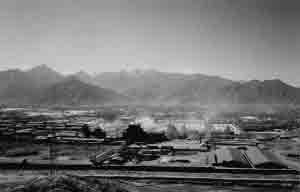
Drapchi Prison, or Lhasa Prison No. 1, is the largest prison in Tibet, China, located in Lhasa. Drapchi is named after its location and was originally a military garrison until it was converted into a prison after the 1959 Tibetan Uprising. It is roughly one mile from the city centre and is the main prison for judicially sentenced prisoners in Tibet. It was the primary place for the detention of political prisoners before 2005 when the newer and modernised Chushur Prison was built. Drapchi also goes by the name Delapuxie prison, which has sometimes been listed as a separate prison online.
The Tibetan Youth Congress (TYC) is an international non-governmental organization that advocates the independence of Tibet from China. With around 30,000 members in the Tibetan diaspora, it is the largest of the pro-independence organizations of Tibetan exiles with 87 branches in 10 countries listed on the organisation's website. The current president of the Tibetan Youth Congress is Gonpo Dhundup.
The Green Book is a document issued since 1971 by the Central Tibetan Administration to Tibetans living outside Tibet, and described by the issuing organization as "the most official document issued by the Tibetan Government in Exile." More than 90 percent of Tibetan exiles own one. It serves as a receipt book for the person's "voluntary taxes" to the CTA, and has been described by a CTA official as "the passport of the exiled Tibetans to claim their rights from the Tibetan Government in Exile". The CTA says that in the future, the document "will become the basis for claiming Tibetan citizenship".
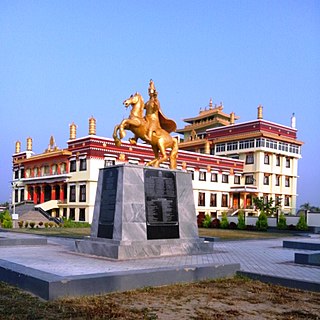
The Tibetan diaspora are the diaspora of Tibetan people living outside Tibet.
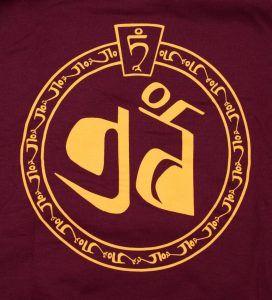
The Tibetan Nuns Project is a non-profit organization whose purpose is to support Buddhist female monastics in India from a variety of Tibetan Buddhist lineages. It helps nuns who want to study and advance their ordination.
Tsering Dolma Gyaltong was a Tibetan spiritual leader living in exile in Toronto, Ontario, Canada. Tsering was active in being a Founding Member of the Tibetan Women's Association and re-establishing it again in 1984.
Human rights in Tibet is a contentious issue. Reported abuses of human rights in Tibet include restricted freedom of religion, belief, and association; arbitrary arrest; maltreatment in custody, including torture; and forced abortion and sterilization. The status of religion, mainly as it relates to figures who are both religious and political, such as the exile of the 14th Dalai Lama, is a regular object of criticism. Additionally, freedom of the press in China is absent, with Tibet's media tightly controlled by the Chinese leadership, making it difficult to accurately determine the scope of human rights abuses.
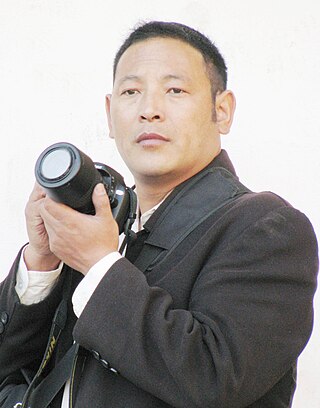
Yeshe Choesang is an India-based Tibetan journalist, photographer and author who focuses on politics, Freedom of press, business, human rights and environmental issues in Tibet and China.

The Tibet Post is an online publication founded by a group of Tibetan journalists with the primary goal of promoting democracy through freedom of expression within Tibetan communities who are both within and outside of Tibet.

Protests and uprisings in Tibet against the government of the People's Republic of China have occurred since 1950, and include the 1959 uprising, the 2008 uprising, and the subsequent self-immolation protests.

Chen Quanguo is a Chinese retired politician who was the Chinese Communist Party Committee Secretary of Tibet Autonomous Region from 2011 to 2016 and of the Xinjiang Uyghur Autonomous Region from 2016 to 2021, making him the only person to serve as the Party Secretary for both autonomous regions. Between 2017 and 2022, he was a member of the 19th Politburo of the Chinese Communist Party and was also Political Commissar of the Xinjiang Production and Construction Corps concurrently with his position as Xinjiang Party Secretary.
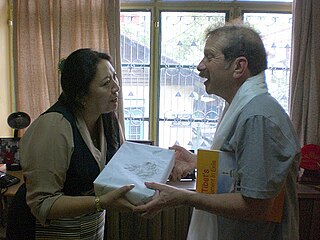
Dölma Gyari is a well-known Tibetan politician in exile, a former activist, active since the early 1980s.

Tibet Justice Center, is an American legal association founded in 1989 that advocates human rights and self-determination for the Tibetan people.
Prostitution in Tibet is thought to have existed for centuries. Testimonies of its existence were provided by outside visitors in the first half of the twentieth century. According to the British writer Christopher Hale, due to the practice of polyandry in Tibet, many women were unable to find a husband and moved to villages and towns, where they fell into prostitution. Their clients came from the caravans crossing the Tibetan plateau, and also from the monasteries.
Anti-Tibetan sentiment refers to fear, dislike, hostility, and racism towards Tibetan people or anything related to Tibetan culture in general. Anti-Tibetan sentiment has been present in various regions of Bhutan, China, India, and Nepal at various points in time. Anti-Tibetan sentiment in South Asia is due to the presence of Tibetan immigrants in those countries. Anti-Tibetan sentiment in China has been fueled by Tibet's historical annexation by China on multiple occasions throughout the centuries. This annexation led to ongoing tensions between Tibetans and Han Chinese, with Tibet currently being under the administration of the People's Republic of China.

The Tibet women's football team is a national association football team controlled by the Tibet Women's Soccer (TWS), an organization of exiled Tibetans. Its current team manager is Gompo Dorjee.

Dolma Yangchen is the president of the Tibetan Women's Association (TWA).











